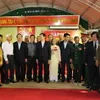ASEAN-US Summit to further strengthen ties
In November 2015, during the 3rd ASEAN-US summit in Kuala Lumpur, Malaysia, the ASEAN and the US decided to upgrade their ties to a strategic partnership, as well as approved the adoption of a Plan of Action to implement the ASEAN-US Strategic Partnership from 2016-2020. Also at the event, US President Barack Obama officially invited ASEAN leaders to attend the ASEAN-US summit hosted by the US. Many experts regard the ASEAN-US summit in Sunnylands as a historic event.
Tran Viet Thai, Deputy Director, Institute for Foreign Policy and Strategic Studies, Ministry of Foreign Affairs said: The upcoming ASEAN-US Summit is an important event, as it's the first summit among leaders from the ASEAN and the US after the official formation of the ASEAN community. The invitation of US President Barack Obama expresses the respect that the US has for the ASEAN and its leaders. Through summits like this, the US will help the ASEAN maintain peace, stability, and unity, as well as its central role in the region.
Since establishing a dialogue in 1977, and adopting an enhanced partnership in 2005, the two sides have continuously promoted relationships in many areas, including politics, security, economy, society, and culture. ASEAN and US leaders are expected to discuss these areas in the coming summit.
Do Son Hai, Head of the Department of International Politics and Vietnamese Diplomacy, Diplomatic Academy of Vietnam said: I think the first issue to be discussed during the summit could be terrorism. Especially, after the Jakarta attack, this should be a hot issue in Southeast Asia. And the adoption of Trans-Pacific Partnership Agreement will also be an important topic for discussion between the US and the ASEAN.
With the growing role of the ASEAN, especially after the official formation of the ASEAN community, the upcoming summit is expected to enhance cooperation between the the US and the ASEAN. However, a greater expectation of the Sunnylands summit is the establishment of roadmaps for cooperation between the US and the ASEAN to ensure stability, peace, and development in the Asia-Pacific region.
Tags:





